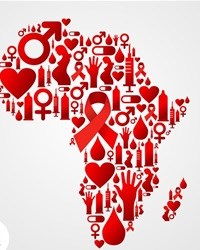Subscribe & Follow
#AfricaMonth
African countries set to end AIDS, TB, Malaria by 2030

This meeting follows the adoption of the ‘Africa Health Strategy and the Catalytic Framework to End AIDS, TB and Eliminate Malaria in Africa by 2030’. The meeting deliberated on the AIDS Watch Africa progress report for consideration by Africa’s Heads of State and Government.
“AIDS, TB and Malaria remain key challenges for the development of our continent. The Africa Health Strategy and the Catalytic Framework to end AIDS, TB and Eliminate Malaria by 2030 provides a clear policy direction for the continent. Our countries should continue on the path set by the Abuja Declaration to increase the budget allocated to health,” said Assane Ngueadoum, minister of health of the Republic of Chad.
The meeting briefed the experts on Africa’s new health policy architecture that will be endorsed by the Kigali Summit. The revised African Health Strategy provides the overarching superstructure to address Africa’s broad health and development agenda in the next 15 years. To strengthen health systems, the strategy addresses issues related to health financing, governance and improved multi-sectoral partnerships. The framework also refocuses service delivery, community empowerment and seeks to expand social protection to address equity. The blueprint also prioritises human resources for health, commodity security, regulatory and support environment for provision of quality medicines and technologies, disease surveillance and disaster management.
Catalytic Framework
“We set the tone in Abuja to end AIDS, TB and Malaria by 2030. The Catalytic Framework adopted by ministers of health provides a roadmap to achieve this. Now we have the task of proper implementation,” said Ambassador Olawale Maiyegun, director for social affairs of the African Union Commission.
The Catalytic Framework provides a business model for investing for the impact to end AIDS, TB and Eliminate Malaria in Africa by 2030. The framework focusses on three strategic investment areas, each with clear catalytic actions. These areas are: strengthening health systems; generation and use of evidence for policy and programme interventions; and advocacy and capacity building.
The Framework provides bold and ambitious targets to end the three diseases by 2030. However meeting the Catalytic Framework targets will require significant investment in health.
The world is already witnessing a period of plateauing development partner support against the backdrop of many pressing global priorities. Significant new revenue from domestic sources for Africa to achieve the set targets is a key priority for the continent. Africa’s long-term development framework, Agenda 2063 commits Member States to overcome “the dwindling and unpredictability of development assistance” by “looking inwards” and “mobilising internal resources for the promotion of her health”.
Africa is already building on the remarkable economic growth, resilient over the previous two decades to fund some of its health programmes.
Africa Scorecard
According to various estimates, countries should spend between $75 and $100 per person on health. It is in this context that the African Union has developed the Africa Scorecard on Domestic Financing for Health as a management tool for governments. The scorecard, adopted by the member states’ experts, will help with financial planning for the health sector and with monitoring performance. The scorecard that will be prepared annually, includes five indicators that measure progress towards meeting domestic and external health financing commitments.
The accuracy of the data on the scorecard will require countries to update the National Health Accounts regularly. African Heads of State committed in the Maputo Plan of Action (2006) to institutionalise the System of National Health Accounts (NHA). Progress has been slow in implementing this commitment. However, 34 AU Member States have adopted the latest System of Health Accounts (SHA 2011) and begun collecting data annually while an additional 11 AU Member States have signed up.
Health finance
The experts’ meeting also reviewed an AU commissioned study on Innovative and Domestic Financing for Health. According to the study, while innovative financing can provide a steady, sustainable and equitable way of generating small amounts of additional resources, it is not a panacea for Africa’s health financing resource challenges. The study points out that innovative health financing can be useful where it is able to create room in the budget for additional spending while not jeopardising the fiscal stability of the economy. Overall, innovative health financing complement traditional government revenue generation and only as a short-term solution to funding needs while governments work to expand the tax base.
The best practices included examples from the Zimbabwe AIDS Levy, Social Health Insurance in Tunisia, Fiscal Space and Innovative Financing Options for Health in Tanzania, Côte d'Ivoire's Debt2Health Debt Swap Agreement, Benin’s airline levy and concessional borrowing to finance the health sector in Botswana, Swaziland and Lesotho. The meeting further discussed the integration of health considerations by improving the costing, allocation and monitoring of health mitigation measures in Environmental and Social Impact Assessments.
The experts meeting also took the opportunity to discuss the implementation of International Health Regulations in Africa in the context of the increasing public health events and recurrent epidemics on the continent and their huge socio-economic impact. The discussion noted the progress made so far in improving the health security of Africa in general and in particular controlling the Ebola outbreak in West Africa and other disease emergencies on the continent.
The meeting noted the efforts of the Africa Centres for Disease Control and Prevention (Africa CDC) in disease surveillance, detection and response including emergency preparedness, as well as its important role in further supporting Member States in the implementation of the core capacities of the International Health Regulations. The meeting also discussed the African Health Volunteers Corps that will strengthen the Africa CDC’s capability to assemble, equip, and mobilise a deployable roster of volunteer medical and public health professionals.
Source: African Press Organisation

APO is the sole press release wire in Africa, and the global leader in media relations related to Africa. With headquarters in Dakar, Senegal, APO owns a media database of over 150,000 contacts and the main Africa-related news online community.
Go to: www.bizcommunity.com/PressOffice.aspx?cn=apogroup



